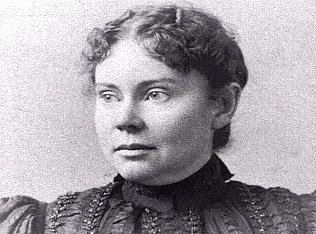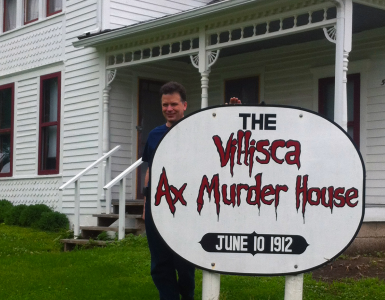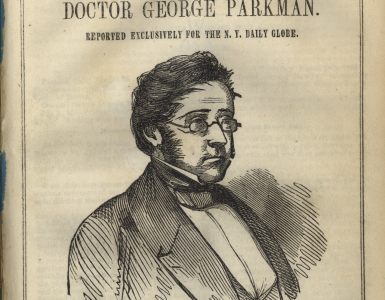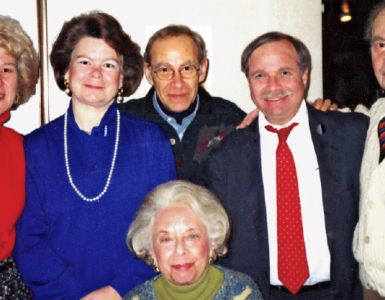by Tina Kate Rouse
First published in June/July, 2004, Volume 1, Issue 3, The Hatchet: Journal of Lizzie Borden Studies.
Charles C. Cook profited well from his association with Lizzie Borden. Cook had been a business associate of Andrew J. Borden, and manager of the Andrew J. Borden Block. Following the murders, he became the chief financial advisor to both Lizzie and Emma. Emma bequeathed Charles Cook $2,000 in her will, but Lizzie was the most generous. Following Lizzie’s death, Mr. Cook received cash, real estate, and a Lincoln sedan; a total reward that exceeded $20,000. Ironically, it may well have been Charles C. Cook who confirmed the Fall River Police Department’s suspicion of Lizzie Borden by providing a possible motive for the murders of Andrew and Abby Borden, leading to her arrest.
Officer William H. Medley conducted an interview with Charles Cook a few days following the murders, and contributed his findings to the Police Department’s witness statements.
August 7, 1892 – William H. Medley, Witness Statements:
Charles C. Cook made the following statement. “I am business manager for Mr. Andrew J. Borden, for the Borden Block. I did not see Mr. Borden Thursday. I have had charge of the Block almost since it was built. He used to come in once in a while, but not every day, nearly always alone. The only other person who ever came with him was his wife, excepting once when Lizzie came with him to sign a deed conveying some property she owned to her father. This property was owned jointly by the two sisters, and was situated on Ferry Street. Lizzie has been here three or four times, once came to ask me about the value of the property she was going to convey to her father. I told her, and she went away.”
(Question) Mr. Cook, have you any reason to believe Mr. Borden had, or had not, made a will?
(Answer) “I do not think Mr. Borden had made a will, unless it has been made recently. I will tell you how I know. He came to my office one day when I was writing, and waited until I finished, when I told him I was just writing a will. He said” ‘Charles, do you know that is something I have never done yet, but I must attend to it.’ ”
(Question) Mr. Cook, do you know of anything that would lead you to imagine that Lizzie and her father did not get along well together?
(Answer) “I do not like to answer that question on account of my position as custodian of property, as I do not know what my relations may be with the family, when this thing is settled.”
(Question) Would you be willing to answer that question in strict confidence to the City Marshal? (City Marshal Rufus B. Hilliard)
(Answer): “Yes sir, I would.”
Within a week (and a few days following Lizzie Borden’s arrest), an article appeared in The New York Herald on 13 Aug. 1892 (Kent/Flynn, 111):
Chief Hilliard said to me to-day that Mr. Borden was about to make a will. This statement was made to the Chief by a man whose name he declines to mention. He avers, however, that the old gentleman had been at work making an inventory of his property during the ten days preceding his murder. Mr. Borden had even departed from his usual reticence about his own private affairs and had told Chief Hilliard’s informant that he intended to devise his property “according to his own ideas.”
Additionally, this item appeared around the same time period—The Fall River Herald (Kent/Flynn, 131):
(Officer Seaver): What the government may consider its strongest point against the accused I am not prepared to say.
. . . . . . . . . . .
Notes. The question as to whether Mr. Borden made a will or not is receiving considerable attention. The Herald is in a position to state authoritatively that no such document is in existence. C.C. Cook, the real estate agent, states that any statement attributed to him as to how Mr. Borden intended to dispose of his property is false. He has never spoken of the matter, and what is more will not do so at the present.
What Cook had meant to be off the record quickly became cause for speculation, and a probable factor in the police department’s search for a motive. Charles Cook realized he had said too much to Hilliard, and the “strict confidence” had been breached. The time had come to deny. Emma and Lizzie had signed a probate document on August 5, 1892 stating they were the sole heirs of Andrew J. Borden. Cook had to make a choice. He could maintain an ethical loyalty to the late Andrew Borden by testifying all he knew, or instead, swear a new mercenary loyalty to the Borden sisters. He chose to go where his bread was buttered. Going against Lizzie Borden could mean losing his position at the Andrew J. Borden Block and any future Borden financial business. However, by aligning himself with the sisters, Cook would ensure himself a potentially invaluable position with Lizzie and Emma, the legal heirs of Andrew Borden. By the time of the preliminary hearing, Cook had pledged his allegiance to Lizzie Borden. Cook did not testify at the inquest, however, he was called to testify later that month at the preliminary hearing. After Cook’s testimony at the preliminary hearing, the police and the Prosecution knew they would receive no further co-operation from Cook.
Preliminary Hearing
By late August, Charles C. Cook had changed his official story. He vehemently denied ever saying what Medley wrote in the Witness Statements— Charles C. Cook (Preliminary Hearing, 206-208)
Q. (Mr. Knowlton.) Charles C. Cook is your name?
A. It is.
Q. What is your business Mr. Cook?
A. Insurance.
Q. Did you have any business relations with Andrew J. Borden?
A. Yes sir.
Q. What were they?
A. I had charge of his building on the corner of Anawan and South Main Street.
Q. That is a block he has erected within a year or two, a business block?
A. Yes sir.
Q. Were you in the habit of seeing him often?
A. Yes sir.
Q. How often?
A. Well, three or four times a week.
Q. Do you remember the day of the murder?
A. Yes sir.
Q. Did you see him that day?
A. I did not.
Q. You did not see him on that day?
A. Not until afterwards.
Q. You saw him dead?
A. Yes sir.
Q. You did not see him alive?
A. No sir.
Q. Did you see him the day before the murder?
A. I saw him I think going down Main Street, on the other side of the street from the building, as I stood in the office.
Q. What day was that?
A. That would be Wednesday.
Q. What time of day?
A. I think in the forenoon, I do not remember the time.
Q. When was the last time you saw him to have any talk with him?
A. Tuesday I think; I know it was Tuesday.
Q. Tuesday afternoon or morning?
A. Tuesday forenoon.
Q. Where did you see him then?
A. In the office.
Q. Tuesday before the murder in the forenoon?
A. Yes sir.
Q. You had some talk with him that time?
A. Yes sir.
Q. Did you have any talk with reference to a will?
A. No sir.
Q. Anything said by him about a will?
A. Not that day.
Q. When was it anything was said about a will, if ever?
A. There was nothing ever said only this —-
Q. My question is, when?
A. I do not remember the date, sometime before that.
Q. How long before?
A. Possibly three weeks, two or three weeks.
Q. What was it?
A. He simply told me that he has not one.
Q. Told you what?
A. That he had not any will.
Q. Did he say anything more?
A. No sir.
Q. Anything about making a will?
A. No sir.
Q. At any time?
A. No sir.
Q. Do you remember of his being in there at one time, when you were writing a will, or some instrument, and he asked you what you were writing?
A. I think that called the remark from me. There was a party talking with me about a will.
Q. Whether you remember that event?
A. I remember was there when he spoke about not having a will; there was a party in the office that I had been doing some work for.
Q. Is that the interview you spoke of a while ago?
A. Yes sir.
Q. At that time you were drawing a will?
A. No, I was not drawing the will at that time. The party came in to ask a question about it. That was after it had been drawn.
Q. Did he then say anything about making a will?
A. He did not.
Q. Have you ever said that he did?
A. No sir.
Q. Do you remember of talking with Mr. Medley the next day after the murder, or two days after the murder?
A. I remember he was in my office one night; I think it was a Saturday night.
Q. Do you remember of telling Mr. Medley about what he said to you?
A. I do not remember exactly what I told him. I know Mr. Medley asked me a good many questions; some I answered, and some I did not.
Q. Do you remember of telling Mr. Medley what he said to you?
A. I think possibly he asked me if there was anything said about a will.
Q. Do you remember of telling Mr. Medley what he said to you?
A. No, I do not remember exactly what I did tell Mr. Medley.
Q. Do you remember of telling Mr. Medley Mr. Borden said to you “what are you doing?” And you said you were making a will.
(Objected to.)
Q. Do you remember of saying to Mr. Medley that Mr. Borden told you that that was something that he had not done, and must do?
A. I did not say anything of that kind sir.
(No Cross Examination.)
In the Witness Statements, Cook had introduced information to Officer Medley freely and without any hesitation nor loss of memory. He said, “I do not think Mr. Borden had made a will, unless it has been made recently. I will tell you how I know . . .” He also told Officer Medley that Lizzie had in fact been in his office to discuss business, “three or four times.” Cook’s most telling statement is, “I do not like to answer that question on account of my position as custodian of property, as I do not know what my relations may be with the family, when this thing is settled.” Cook then agreed to speak off the record with Marshall Hilliard.
At the preliminary, Cook even denies he was writing a will when Andrew Borden came to his office. For no apparent reason, Cook changes his story to say he was not drawing up a will at that time at all, but attending to some questions a client was asking about a will that had previously been drawn. Being asked three times as to his recollection of that conversation with Mr. Borden which he had told to Medley, Cook denied it three times. The discrepancies between Cook’s witness statement and his official testimony seem reminiscent of Lizzie Borden’s conflicted Inquest statement.
The deed was done. Following the preliminary hearing, on September 2, 1892, Emma Borden received the title of administratrix for her father’s estate. No further evidence ever came to light to prove Andrew Borden had been planning to write a will. Neither the prosecution nor the defense had any further use for Cook’s denials. Charles C. Cook was not called to testify at the trial.
Andrew J. Borden may very well have been considering a will in 1892. He was about to turn seventy in September; a milestone he could not deny. He had signed as a witness for his friend Southard H. Miller’s will in January of that year. (Rebello 24) Lizzie and Emma had also sold the Ferry Street property back to him in July 1892, just prior to their respective summer trips away from home. There has been much speculation as to what was going on in the Borden household that summer with regard to Andrew’s property. The fact that Cook stated Lizzie came in alone to discuss the value of the Ferry Street property with him shows how Lizzie was determined to get a good price from Andrew. Lizzie was doing research on her own, and possibly establishing a business relationship with Cook. It makes sense that Andrew “intended to devise his property ‘according to his own ideas.’ ” Mention of the subject of wills by Cook or anyone else would have reminded Andrew that he needed to take care of the matter.
Unfortunately, whatever exchange passed between Charles Cook and Marshall Rufus Hilliard remained off the record, except in speculation.
Perhaps the final test of Cook’s loyalties occurred following the death of Lizzie Borden. Lizzie’s principal legatees, Helen Leighton and Grace Howe, found they had to contest Charles Cook’s claims against Lizzie’s estate on at least two occasions. The first was the matter of the Henry Property, a house and land that were purchased with Lizzie’s money but placed in Cook’s name as a trustee to avoid publicity. Cook argued Lizzie meant him to have the property when she died. The second occurred when Cook sold Lizzie’s half interest in the Andrew J. Borden building; he received a commission $6,500 and proceeded to charge the estate an exorbitant $10,000 executor’s fee. Leighton and Howe won over Cook in the case of the Henry Property, both in Probate Court, and again in his appeal to the Supreme Court. Probate Court granted Cook an executor’s fee of $5,000 in the matter of the Andrew J. Borden Building. By arguing with Lizzie Borden’s principal heirs, Charles C. Cook remained loyal only to himself.
At the time of his death, Charles C. Cook was a widower with no children. Cook had profited well from the choice he made in August of 1892. He left a large portion of his own estate to The Second Baptist Church of Fall River. As insurance had been his primary vocation, perhaps a stairway to Heaven was his final investment.
Works Cited
Kent, David. Lizzie Borden Sourcebook. Boston: Brandon Publishing, 1992.
Preliminary Hearing in the Borden Case before Judge Blaisdell, August 25 through September 1, 1892. Fall River, MA: Fall River Historical Society. Rpt. Orlando: PearTree Press, 2004.
Rebello, Leonard. Lizzie Borden: Past and Present. Al-Zach Press, 1999.
The Witness Statements. Orlando: PearTree Press, 2004.






